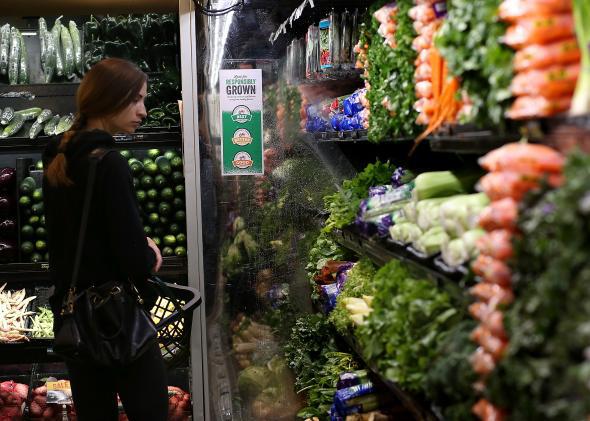The organic struggle is real and ongoing for Whole Foods, which has failed to woo customers to Wall Street’s satisfaction despite cutting its grocery prices. Whole Foods said Wednesday that sales at stores open roughly a year grew 3.6 percent in the second quarter, falling short of analyst expectations for 5.3 percent growth. Shares are down about 10 percent in extended trading, after closing basically unchanged, at $47.72, during the normal session.
Whole Foods’ whiff on same-store sales comes after it reported fairly strong results in the two preceding quarters. In February, Whole Foods posted a record $4.5 billion in total sales and same-store sales growth of 4.5 percent. That was shortly after the kickoff of the company’s “values matter” branding campaign aimed at reversing its much-derided “whole paycheck” image. “We are encouraged by the pricing experiments we are running in several markets, and if results continue to be positive, we expect to expand our test to more markets during the year,” Whole Foods co-CEO John Mackey said at the time.
On the earnings call Wednesday, Whole Foods executives said they were “reaffirming” that the values matter campaign is working. They attributed the slowdown in same-store sales growth to several factors—reduced market share in cities including Chicago and Florida, increased competition, and tough weather. Mackey had a positive spin on that. “We’ve been so successful that we’ve bred a lot of competition,” he told investors. “Everyone’s jumping on the natural and organic brand wagon and frankly, a lot of that’s due to our success.”
In addition to quarterly results, Whole Foods also announced on Wednesday that it plans to introduce a “new, uniquely branded store concept” to court value-savvy, digitally oriented consumers such as millennials. Whole Foods plans to start opening some of those new stores in 2016 and says the “complementary brand” should have high growth potential. Execs wouldn’t reveal too many details about the upcoming brand/store on the call, but suggested that the new brand will appeal to consumers who haven’t gotten past their “whole paycheck” qualms.
“We think there are certain customers that the Whole Foods brand is attractive to, but there’s others that it’s less attractive to,” Mackey said, before pointing to millennials specifically. “We think a streamlined, hip, cool, technology-oriented store—a store unlike one anyone’s ever seen before … is going to be pretty attractive to that particular generation. You can’t envision it yet because no one has. We’re creating it.”
